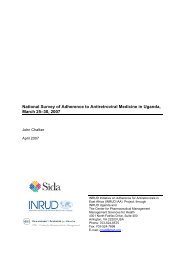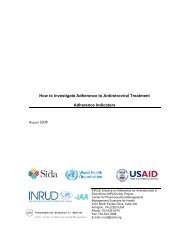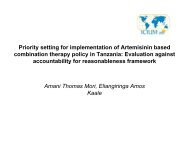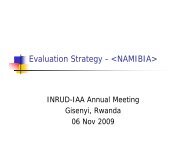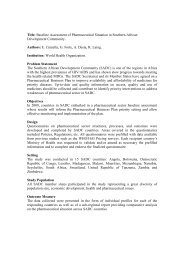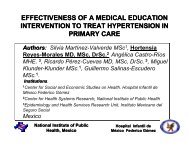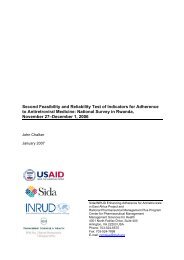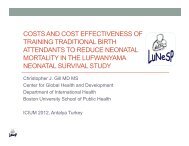How to investigate levels of Adherence to antiretroviral ... - INRUD
How to investigate levels of Adherence to antiretroviral ... - INRUD
How to investigate levels of Adherence to antiretroviral ... - INRUD
You also want an ePaper? Increase the reach of your titles
YUMPU automatically turns print PDFs into web optimized ePapers that Google loves.
<strong>How</strong> <strong>to</strong> Investigate <strong>Adherence</strong> <strong>to</strong> Antiretroviral Treatment:<br />
An Indica<strong>to</strong>r-Based Approach<br />
Record keeping<br />
17. The percentage <strong>of</strong> facilities with a functioning clinic attendance register showing all<br />
patients who visited each day.<br />
18. The percentage <strong>of</strong> facilities with an appointment book or other appointment system<br />
showing all patients due for clinic attendance each day.<br />
Rationale<br />
Source <strong>of</strong> data<br />
Data collection<br />
Computation<br />
Comments<br />
Without a system <strong>to</strong> know who is expected and who has already kept their<br />
appointment, it is impossible <strong>to</strong> moni<strong>to</strong>r whether patients have come when<br />
they were scheduled, and therefore not possible <strong>to</strong> contact them and remind<br />
them <strong>of</strong> their missed appointment.<br />
Facility interview.<br />
While doing the facility interview ask <strong>to</strong> look at the appointment and<br />
attendance and appointment systems and check for whether it is being used<br />
successfully on the day <strong>of</strong> the interview.<br />
Clinic attendance register—The presence <strong>of</strong> a functioning clinic attendance<br />
register.<br />
Appointment book—The presence <strong>of</strong> a functioning appointment book system.<br />
It is important <strong>to</strong> check whether the system is functioning. It would help <strong>to</strong><br />
ask who is expected at the next clinic day, who came yesterday, and how<br />
many failed <strong>to</strong> turn up yesterday? If these questions can be answered easily,<br />
the system is working.<br />
Patient care indica<strong>to</strong>r determinants<br />
Information and communication<br />
17. Patient knowledge <strong>of</strong> ARV regimen—Percentage <strong>of</strong> patients who know when <strong>to</strong> take<br />
each <strong>of</strong> their ARV medicines and how much <strong>to</strong> take each time.<br />
Rationale<br />
Source <strong>of</strong> data<br />
Data collection<br />
Computation<br />
Comments<br />
Detailed knowledge <strong>of</strong> the correct ARV regimen is essential <strong>to</strong> adherence.<br />
Patient exit interviews<br />
Based on a sample <strong>of</strong> 30 patients attending on day <strong>of</strong> data collection (or all<br />
patients if < 30 attend that day)—For each ARV in treatment regimen, ask<br />
―Could you please tell me how many times a day you take this medicine, how<br />
much you take each time, and whether you take it before or after eating or<br />
with your meal?‖<br />
Number <strong>of</strong> patients knowing all three aspects <strong>of</strong> all ARVs/number <strong>of</strong> patients<br />
asked) × 100<br />
Need <strong>to</strong> determine correct treatment regimen for all ARVs used.<br />
This is asked during the exit interview leading up <strong>to</strong> the self report on missed doses over the<br />
last three days. So for each ARV in turn the interviewer asks the patient "when are you<br />
meant <strong>to</strong> take this medicine?" and then asks ‚and in the last three days have you missed any<br />
<strong>of</strong> your doses?‛<br />
22



